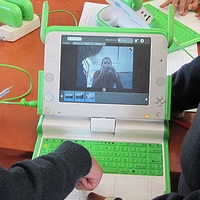Resumen en español al final del artículo
Earlier this week zunia.org, a Development Gateway Web site for development practitioners, published an interview about OLPC which they had conducted with yours truly.
Their questions provided me with a great opportunity to share some of the thoughts which have been roaming around my head for quite a while but which I hadn't yet managed to turn into readable posts. Even though it's a fairly short interview I feel that we managed to cover quite a bit of ground ranging from IDB's OLPC Peru evaluation over indicators for measuring improvements in education to what lessons other initiatives can learn from OLPC.
Naturally the first question was related to the much discussed IDB evaluation of Peru's Una Laptop por Niño and I'm going to leave you with that excerpt as a teaser:
Zunia: Let's begin with the much discussed recent evaluation of One Laptop Per Child (OLPC) by the Inter-American Development Bank. Using data collected from some 319 primary schools in rural Peru, the evaluation concludes that OLPC's XO laptops produced no measurable gains in student achievement. What is your opinion on this evaluation?
Christoph: I think this evaluation is an extremely important effort which provides valuable contributions to the knowledge about Information and Communications Technology for Education (ICT4E) interventions such as Peru's OLPC project. In my mind the evaluation as well as the many discussions which have resulted from it really are significant steps towards ICT4E becoming more evidence- and less faith-based.
At the same time it's important to realize that the evaluation is still very much work-in-progress and the results published earlier this year are built on data collected a mere 15 months after the XO laptops were distributed. I therefore think that the currently available results from the evaluation are an important foundation for figuring out what is actually happening in Peru's OLPC project, what challenges there are, and how to address them. However it would be premature to use these results as the basis for passing the final judgment on the merits of OLPC in general, or even just OLPC in Peru for that matter.
It also strikes me as noteworthy to point out that although most attention has focused on the areas where no measurable differences were found, the evaluation's report also documents some benefits on cognitive skills. At least to me it's unclear at this point what these cognitive improvements really mean but it's definitely an interesting observation.
So overall the evaluation and the discussions around it are well worth reading and I personally can't wait to see the next update from it.
You can read the full interview over on zunia.org and I'm looking forward to your comments, questions, and other feedback you may have.
Resumen en español: A principios de esta semana zunia.org, un sitio Web de Development Gateway para profesionales del desarrollo, publicó una entrevista acerca de OLPC que habían hecho conmigo. Tocamos varios temas como la evaluación de OLPC en el Perú por el BID, indicadores para medir la educación y que lecciones otros proyectos pueden aprender de OLPC.


